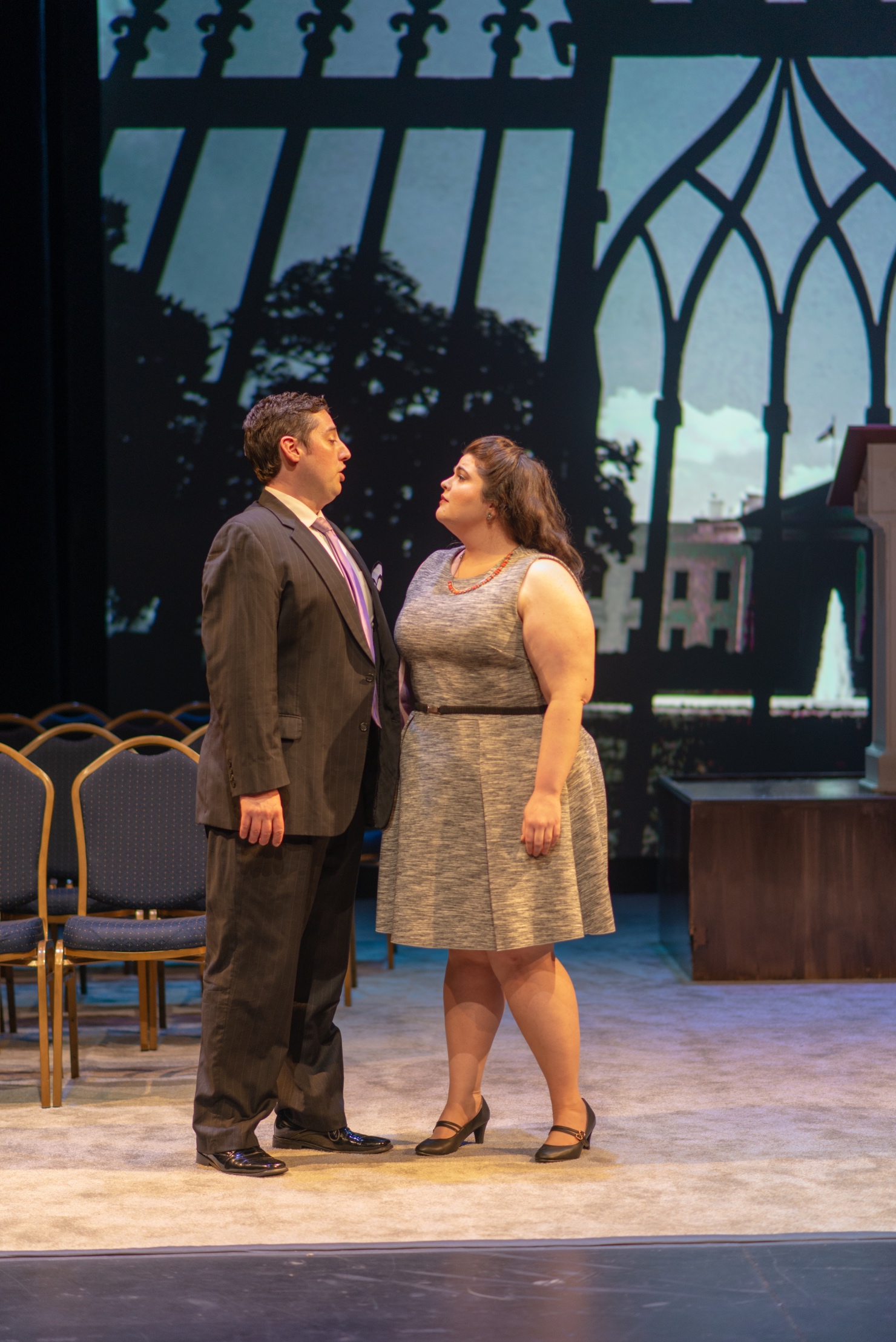
The Mikado in the White House
ReviewThe fourth annual New York Opera Fest has begun and the next two months of eclectic productions, from traditional to cutting edge, promise everything from the ridiculous to the sublime. Both adjectives are apropos to the presentation of Gilbert and Sullivan’s The Mikado at The Bronx Opera.
To be sure, there is some marvellous music-making up at the Bronx Opera from the mighty but modestly sized orchestra and chorus. The 32 musicians under the baton of Michael Spierman (including only one bass and one percussionist) give a full and almost flawless tribute to the music of Sir Arthur Sullivan. Though the opera is written with the men and women of the chorus in a mostly “split squad” format, talented chorus master Michael C. Haigler gets the most out of both sexes: even when there are only about nine men or ten women on stage they sound twice as big.
Topical references are randomly thrown in, and the effect is the same as that of a downed power line that thrashes all over the street.
The libretto of The Mikado, as written by W.S. Gilbert, was meant as a social satire, skewing the corrupt government and the somewhat Kafkaesque judicial system in England at the time (1885). To get it past the Victorian censors, Gilbert disguised his critique of the British as a story about a fictional Japanese town, (even utilizing fictional Japanese words.) This was another level of spoofing as the upper class of London, at that time, was obsessed with Japanese culture (which had only recently made it to their shores).

Although meant to generate laughs at the expense of privileged white people, it’s extremely difficult today to present this show, even as gently written as it is, without entering dangerous racist waters. And unless you have an entirely Asian cast, the show is open to criticism as “yellow face.” So what is one to do in this day and age with the story of a Narcissistic man who is completely unqualified to be a leader, who makes up his own rules (all for his own benefit), and is supported by corrupt sycophants? You probably can guess – you make it a story about Donald Trump, and you take it out of Japan and put it squarely inside the Beltway.

This is not a bad idea from director (and script editor) Benjamin Spierman, but his updated libretto has none of the subtlety and little of the wit and cleverness as originally written by Mr. Gilbert. Topical references are randomly thrown in, and the effect is the same as that of a downed power line that thrashes all over the street.
The principal singers do their best to get laughs from all the comedic misfiring but for the most part, too much is asked of them.
Perhaps a better comic writer could have pulled this off, as there are some parallels to be made. But a lot of it is a thin plastic wrap that doesn’t quite stretch over the proceedings. For example, the character of Katisha, is described as so abhorrently ugly that only her collarbone, elbow and heel are attractive. Mr. Spierman’s inspiration is to put Katisha in a red pantsuit a la Hillary Clinton. If this is an attempt at “equal time”, we’ve quickly left the realm of satirizing the foibles of Mr. Trump and entered the (unfunny) world of body-shaming Ms. Clinton.

Some of the concepts have potential – the “Gentlemen of Japan” have been updated as reporters for the New York Times. However, they all wear overly long red ties, à la Trump, and this makes no sense unless they are actually reporters for Fox News. Another good idea: the opening number is set in a press room. Unfortunately, we never leave that set and Mr. Spierman handicaps his staging to left chairs, right chairs, and center stage. He also has added some rudimentary choreography for his singers that ranges from a half-hearted hand-jive to a sloppy kick-line. The characters are also called upon to constantly whip out their cellphones to text and take selfies, etc., and the joke wears thin after the first few minutes (yet continues unabated for the entire two hours of the opera).

The principal singers do their best to get laughs from all the comedic misfiring but for the most part, too much is asked of them. Luckily, their voices range from very, very good to excellent and every one of them deserves enthusiastic applause.
The best songs, not surprisingly, were the ones that were spared a rewrite.
As Ko-Ko, Sean Kroll does not attempt to do a direct Trump impersonation but rather extracts some humor as a kind of rubber snake with his physical clowning and hissing asides. His voice is made for this kind of light opera especially in his sweet rendition of “On a Tree by a River” (aka the famous “Titwillow” aria).

Even though Erica Koehring not only has to wear that pantsuit but actually call attention to it by saying “I love pantsuits,” she delivers one of the two best vocals of the night with the lyrically unaltered “Alone and yet alive.” The best songs, not surprisingly, were the ones that were spared a rewrite and so Barbee Monk, as Yum-Yum, shined in a strong and clear “The sun whose rays are all ablaze”.
Tenor Jonathan Price’s voice rings brightly through “A Wand’ring Minstrel I” and all his solos. Another example of how good these performers are when left alone with the material.
Michael Blake O’Hearn, as a wonderful Poo-Bah, has a basso that comes up from the very depths of his big frame. Along with MaKayla McDonald as Peep-Bo, he also has the best deadpan comic timing of anyone in the show. He makes the most of the running joke where he recites a long list of the numerous jobs he holds in service of Ko-Ko: “Chief of staff, Secretary of the Treasury, Secretary of the Navy, Supreme Court Judge…”, etc. (Note: Mr. Spierman shouldn’t have added to the list “Driver of the Billy Bush Bus.”)

John Callison, excellent as Pish-Tush, has a pleasingly warm baritone and, along with Jackie M. Hayes as co-conspirator Pitti-Sing, displays virtuosity in many of the word salads provided by Mr. Gilbert (and Mr. Spierman.)
The character of the Great Emperor (the Mikado himself), who does not appear until almost the end of the opera, has been reimagined as Vladimir Putin and Wil Kellerman accomplishes the great feat of masterfully singing while juggling with a Russian accent. Although this is a humorous surprise – the great Mikado, the greatest power in the country, turns out to be the Russian President – the surrounding plot points have not been changed to have it make sense. The Hillary Clinton character is set to marry Putin’s son, for example.
You really can’t stop and think about these things in the Bronx Opera production…unfortunately, the original Gilbert & Sullivan operetta was created to make you stop and think.

Comments